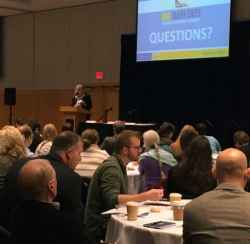December 2015 Highlights: An Amazing Gift for UMSN, Plus Students Give Back and Faculty Share New Findings
GIVING BLUEDAY
U-M’s second annual Give Blueday is being hailed as a resounding success, with the School of Nursing receiving the largest gift campus-wide. A $1 million donation was given to support nursing student scholarships. In addition, a $50,000 gift will support work with victims of human trafficking, and dozens more donors gave to support school and student needs. "We appreciate every gift," said Dean Kathleen Potempa. "We have special gratitude for the donations that are a lasting legacy for the future of nursing and health care." Preliminary estimates show the day’s gifts to UMSN totaling $1,054,530. Overall, nearly 7,000 donors donated $4.36 million to U-M.
GIVING BACK

U-M’s “Little Victors” will stay cozy this winter thanks to U-M’s Student Nurses’ Association. The group hosted an event to make fleece blankets which will be donated to patients at C.S. Mott Children’s Hospital. Dozens of nursing students participated, and Dean Kathleen Potempa stopped by to chat with students and show her support.
RESEARCH FINDINGS
CAMPUS COLLABORATION
 The School of Nursing was well represented at U-M Injury Center’s Opioid Overdose Summit. Highlights included a podium presentation by UMSN professor Carol Boyd, PhD, RN, FAAN, who shared that she and colleagues found 75 percent of adolescents in America have access to opioids, with 22 percent having used a controlled substance without a prescription. UMSN’s Dr. Gina Dalhem, Dr. Sarah Stoddard, and Dr. Stephen Strobbe contributed poster presentations to the event. View Dr. Boyd’s slide presentation.
The School of Nursing was well represented at U-M Injury Center’s Opioid Overdose Summit. Highlights included a podium presentation by UMSN professor Carol Boyd, PhD, RN, FAAN, who shared that she and colleagues found 75 percent of adolescents in America have access to opioids, with 22 percent having used a controlled substance without a prescription. UMSN’s Dr. Gina Dalhem, Dr. Sarah Stoddard, and Dr. Stephen Strobbe contributed poster presentations to the event. View Dr. Boyd’s slide presentation.
EBOLA ONE YEAR LATER
“I don’t think it’s going to be perfect, but it will be different, says UMSN Associate Professor Patricia Abbott, PhD, RN, FAAN, FACMI, of predicted improvement to health care systems after the 2014 Ebola epidemic spread to the United States. Nurse.com interviewed Dr. Abbott and reviewed the lessons learned from an expert panel assembled to review an incident in Texas where an Ebola patient was sent home from the hospital. (Days later he returned to the hospital but died; two of his nurses were infected, although they recovered.) Dr. Abbott was the only nurse on the panel that garnered national attention earlier this year.
MICHIGAN ALUMNUS FEATURE
 “From my students, I have learned that teaching and learning about human behavior has just as much or more to do with context, interactions, relationships, and the manner in which this vital material is conveyed,” writes Dr. Stephen Strobbe in an invited essay for Michigan Alumnus. Dr. Strobbe, a UMSN and Dept. of Psychiatry clinical associate professor, shares how he strives to make his course “Mental Health and Illness across the Lifespan” much more than a textbook class. Instead, it is about creating a culture of awareness and support that goes beyond the classroom walls. Dr. Strobbe’s methods have resonated with his students, as shown by his selection for the 2015 Golden Apple award, the main student-selected teaching award at U-M.
“From my students, I have learned that teaching and learning about human behavior has just as much or more to do with context, interactions, relationships, and the manner in which this vital material is conveyed,” writes Dr. Stephen Strobbe in an invited essay for Michigan Alumnus. Dr. Strobbe, a UMSN and Dept. of Psychiatry clinical associate professor, shares how he strives to make his course “Mental Health and Illness across the Lifespan” much more than a textbook class. Instead, it is about creating a culture of awareness and support that goes beyond the classroom walls. Dr. Strobbe’s methods have resonated with his students, as shown by his selection for the 2015 Golden Apple award, the main student-selected teaching award at U-M.
Have news to share? Please send it to [email protected].





